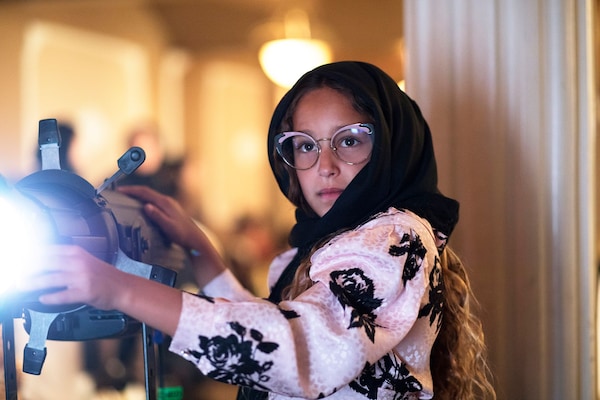The Wedding Singer's Daughter
by Haifaa Al-Mansour
It’s nighttime in 1980s Riyadh, Saudi Arabia. Glittery and glamorous heels climb out of cars. Women shrouded in traditional black abayas make their way into a wedding hall. There, they reveal what’s underneath: dazzling dresses and wild hair. Their true selves set free, unseen by male gaze. There are strict segregation rules in Saudi weddings. All eyes and ears are on the wedding singer; until the electricity cuts out suddenly. “This is the worst wedding singer ever,” guests mutter, condescendingly. Will the young daughter manage to save her mother’s dignity?
The Wedding Singer’s Daughter, directed by Haifaa Al-Mansour, is the 16th commission from Miu Miu Women’s Tales. The acclaimed short-film series invites today’s most profound and original female directors to investigate vanity and femininity in the 21st century.
Based in Los Angeles, Haifaa Al-Mansour is considered the first female Saudi filmmaker. Her debut feature, Wadjda (2013) -about a rebellious girl who wants to break societal laws and ride her bicycle- was a breakout hit, and the first ever foreign-language Oscar entry from Saudi Arabia. As the country undergoes unprecedented cultural reform, which has recently seen women be given the right to drive and the first cinemas open to the public, Al-Mansour’s next film, The Perfect Candidate, will be the first feature to be supported by the new national Saudi Film Council. The comedy- drama follows a young female physician who dreams of participating in male-dominated, municipal elections.
“Trying to build things up, step by step, is very important,” says Al-Mansour. “Patience pays off.” Indeed, Saudi pop- singer Rotana Tarabzouni — who plays the lead character in The Wedding Singer’s Daughter, and composed the music with The Real Satta — describes herself and the women of her generation as, “the necessary and exciting growing pains of any society going through a reform and artistic renaissance.” About the marital setting of her new Miu Miu film, Al- Mansour believes that, “weddings are the actual mirror of society in Saudi Arabia: segregated, fragmented, along gender and class. I wanted to tell the story of those people, and capture that tenderness.”
Al-Mansour says that Women’s Tales have been an inspiring project because, “It’s very important for women to tell their stories. And sometimes it’s hard.” In this new story, the singer’s young daughter is the unlikely heroine. She ignores the other girls’ scornful judgment, and instead uses her nimble mind, just like an independent film-director. “For me, the little girl represents the future,” reveals Al-Mansour, “and the future belongs to outsiders.”














Photos by Brigitte Lacombe









